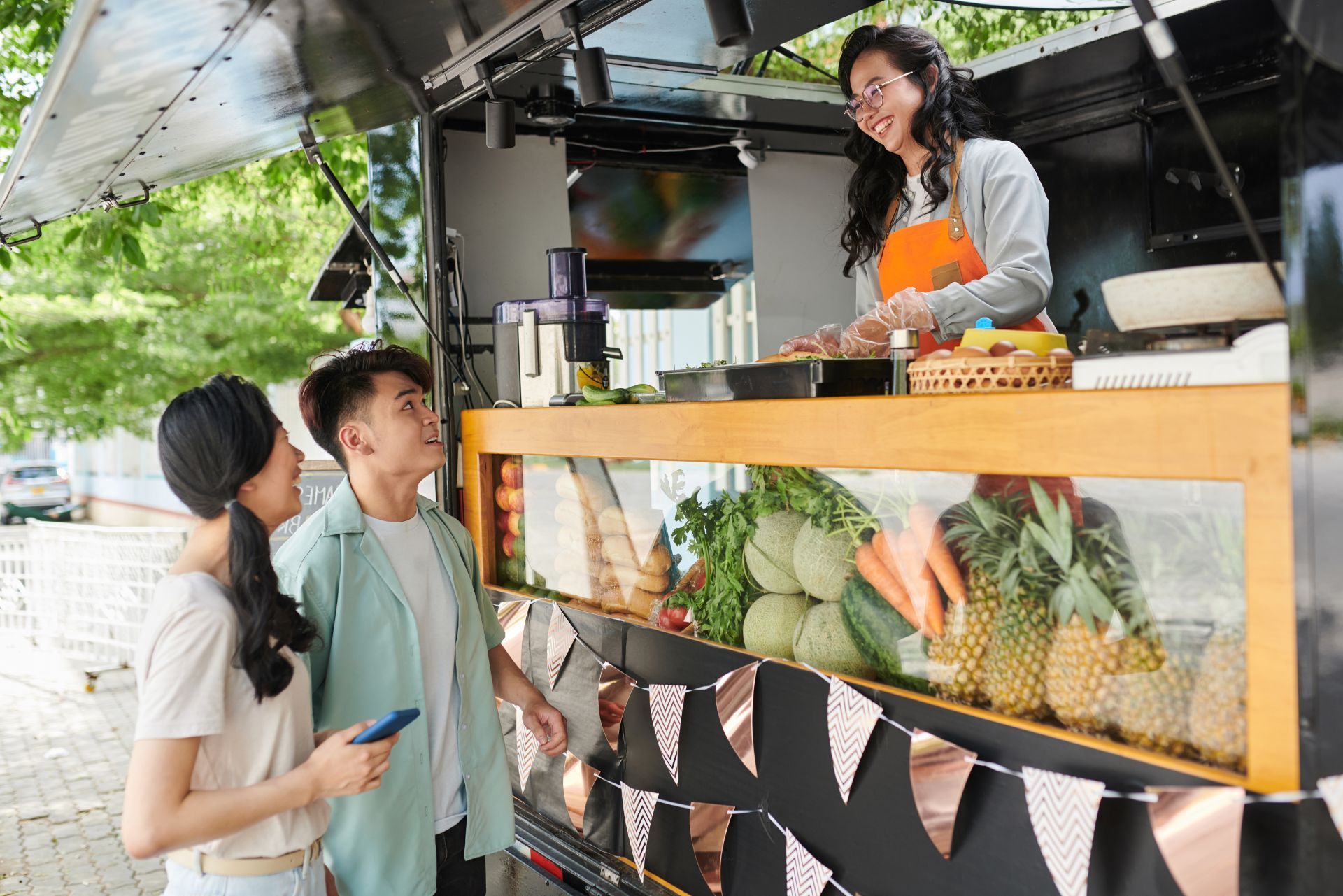
Most Common Business Policies
Index
Contact Us
Operating a food truck in New York can be an exciting venture, offering the chance to serve delicious meals to a diverse clientele while enjoying the bustling atmosphere of the city. However, just like any business, it comes with its own set of risks and challenges. One of the most critical aspects of running a food truck is ensuring that you have the right insurance coverage. This article will delve into the essentials of New York food truck insurance, covering everything from types of coverage to legal requirements and tips for finding the best policy.
Understanding Food Truck Insurance
Food truck insurance is a specialized type of coverage designed to protect mobile food vendors from various risks associated with their operations. This insurance is crucial for safeguarding the business, employees, and customers. Without proper coverage, a single incident could lead to significant financial loss.
Why Insurance is Essential for Food Trucks
The food truck industry is unique, with its own set of challenges. From accidents on the road to foodborne illnesses, the risks are numerous. Insurance helps mitigate these risks by providing financial protection against potential liabilities. In New York, where regulations can be stringent, having the right insurance is not just advisable; it's often a legal requirement. Moreover, having comprehensive insurance can enhance a food truck's reputation, as customers are more likely to trust a vendor that is adequately covered. This trust can translate into increased business, as patrons feel more secure knowing that the vendor is prepared for unforeseen circumstances.
Common Risks Faced by Food Trucks
Food trucks face a variety of risks, including:
- Vehicle Accidents: Collisions can lead to significant damage to the truck and injury to employees or customers.
- Food Safety Issues: Contaminated food can result in health issues for customers and legal action against the business.
- Theft and Vandalism: Food trucks are often parked in public areas, making them vulnerable to theft or damage.
In addition to these risks, food trucks must also navigate the complexities of local health regulations and permits. Each city may have different requirements regarding food handling, preparation, and serving, which can add another layer of risk if not adhered to properly. For instance, failing to meet health codes can lead to fines or even the temporary closure of the business. Furthermore, food trucks often operate in high-traffic areas, increasing the likelihood of accidents or incidents that could lead to claims. Therefore, having a robust insurance policy that covers these specific challenges is not just a safeguard; it is an essential component of running a successful food truck operation.

Types of Coverage for Food Trucks
When it comes to food truck insurance, several types of coverage are available. Each serves a different purpose and can be tailored to meet the specific needs of the business.
General Liability Insurance
General liability insurance is fundamental for any food truck operation. It protects against claims of bodily injury or property damage that may occur as a result of your business activities. For instance, if a customer slips and falls near your truck, this insurance can cover medical expenses and legal fees. Additionally, this coverage can also protect against claims related to foodborne illnesses, which can be a significant risk in the food service industry. If a customer becomes ill after consuming your food, general liability insurance can help cover the costs associated with legal defense and settlements, ensuring that your business remains financially stable.
Commercial Auto Insurance
Since food trucks are vehicles, commercial auto insurance is essential. This coverage protects the truck itself and provides liability coverage in case of accidents. It is different from personal auto insurance and is tailored to the unique needs of businesses that use vehicles for commercial purposes. Furthermore, commercial auto insurance can also cover damages to your food truck due to theft, vandalism, or natural disasters, ensuring that your investment is safeguarded. In addition, some policies may offer roadside assistance, which can be invaluable in the event of a breakdown while on the job, minimizing downtime and maintaining service continuity.
Workers' Compensation Insurance
If your food truck employs workers,
workers' compensation insurance is a legal requirement in New York. This insurance covers medical expenses and lost wages for employees who are injured on the job. It helps protect both the employee and the employer from financial burdens resulting from workplace injuries. Moreover, workers' compensation can also provide rehabilitation services for injured employees, helping them recover and return to work more quickly. This not only fosters a safer work environment but also promotes employee morale, as workers feel valued and protected by their employer. In the competitive food truck industry, demonstrating a commitment to employee safety can also enhance your brand's reputation, attracting more customers who appreciate socially responsible businesses.
Legal Requirements for Food Truck Insurance in New York
New York has specific legal requirements regarding insurance for food trucks. Understanding these regulations is crucial for compliance and to avoid penalties.
Minimum Coverage Requirements
While the exact requirements can vary based on the size and scope of the food truck operation, there are some general guidelines. Typically, food truck operators are required to carry:
- General liability insurance with a minimum coverage limit.
- Commercial auto insurance that meets state minimums.
- Workers' compensation insurance if employing staff.
General liability insurance is particularly important as it protects against claims of bodily injury or property damage that may occur as a result of your food truck operations. This could include incidents such as a customer slipping and falling near your truck or food-related illnesses. Commercial auto insurance, on the other hand, covers damages to your vehicle and liability in case of accidents while driving your food truck. It's advisable to consult with an insurance agent who specializes in food truck operations to ensure that you have adequate coverage tailored to your specific needs.
Permits and Licenses
In addition to insurance, food truck operators must obtain various permits and licenses to operate legally in New York. This includes health permits, food handling permits, and mobile food vendor licenses. Insurance providers often require proof of these permits before issuing a policy.
Each of these permits serves a vital purpose in ensuring public safety and compliance with health regulations. For instance, health permits are issued after an inspection of the food truck to ensure that it meets the necessary sanitation standards. Food handling permits are typically required for anyone who prepares or serves food, ensuring that they are trained in safe food practices. Moreover, the mobile food vendor license is essential for operating in designated areas, and it often comes with specific stipulations regarding the types of food that can be sold and the locations where the truck can operate.
Local Regulations
New York City has its own set of rules and regulations for food trucks. These can include restrictions on where trucks can park, hours of operation, and specific health and safety standards. It's essential to stay informed about local regulations to ensure compliance and avoid fines.
In NYC, food trucks are often required to adhere to strict zoning laws, which dictate where they can set up shop. Certain areas, especially near schools and parks, may have additional restrictions or require special permits. Additionally, food trucks must comply with the city's health code, which mandates regular inspections and adherence to food safety protocols. Failure to comply with these local regulations can result in hefty fines or even the revocation of your operating license, making it imperative for food truck operators to stay updated on any changes in local laws and regulations.

Choosing the Right Insurance Provider
Finding the right insurance provider is a critical step in securing the necessary coverage for a food truck. Not all insurance companies offer the same policies or levels of service, so it's essential to do thorough research. The right provider can mean the difference between a smooth operation and facing significant financial setbacks in the event of an accident or unforeseen incident.
Factors to Consider
When selecting an insurance provider, consider the following factors:
- Experience with Food Trucks: Look for companies that specialize in insuring food trucks or have significant experience in the food service industry. These providers will understand the unique risks associated with mobile food operations, such as equipment breakdowns and liability issues related to food safety.
- Customer Reviews: Check online reviews and testimonials to gauge the experiences of other food truck operators with the provider. Engaging with community forums or social media groups dedicated to food truck businesses can also provide valuable insights and recommendations.
- Coverage Options: Ensure the provider offers a range of coverage options that can be tailored to your specific needs. This may include general liability, property coverage, and specialized policies for food spoilage or equipment failure, which are crucial for maintaining your business's operational integrity.
Getting Quotes
Once you've identified potential providers, it's time to get quotes. Most insurance companies will provide free quotes based on the information you provide about your food truck operation. Be prepared to share details such as:
- The type of food you serve.
- The size of your truck and its value.
- Your annual revenue and number of employees.
In addition to these basic details, consider discussing your business model with the insurance agent. For instance, if you participate in local festivals or events, this may affect your coverage needs. Some providers may offer discounts for businesses that implement safety measures or have a good claims history, so be sure to ask about any potential savings. Furthermore, it’s wise to inquire about the claims process, as a provider that offers a straightforward and efficient claims experience can save you considerable stress during challenging times.
Cost of Food Truck Insurance
The cost of food truck insurance can vary widely based on several factors, including the type of coverage, the size of the operation, and the specific risks associated with the business. Understanding these factors can help food truck operators budget appropriately. Additionally, the nuances of the food truck industry, such as seasonal fluctuations in business and varying local regulations, can also play a significant role in determining insurance costs.
Factors Influencing Insurance Costs
Several elements can influence the cost of food truck insurance:
- Location: Operating in a busy metropolitan area like New York City can increase insurance costs due to higher risks. Urban environments often have more traffic, which can lead to a greater chance of accidents.
- Type of Cuisine: Certain types of food may carry higher risks, affecting premiums. For example, trucks serving fried foods may face higher liability risks due to the potential for grease fires or health-related issues.
- Claims History: A history of claims can lead to higher premiums, while a clean record may result in lower rates. Insurers often assess past incidents to gauge future risk, making it crucial for operators to maintain safety standards.
Average Premiums
On average, food truck insurance premiums can range from $2,000 to $4,000 annually, depending on the coverage selected and the specific circumstances of the business. It's essential to compare quotes from multiple providers to find the best rate. Moreover, operators should consider the different types of coverage available, such as general liability, commercial auto insurance, and workers' compensation, as each can significantly impact the overall cost.
In addition to the basic premiums, food truck owners may also encounter additional costs for specialized coverage options. For instance, if a food truck serves alcohol, liquor liability insurance becomes necessary, which can further increase the total insurance expenditure. Furthermore, seasonal businesses may find that their insurance needs fluctuate throughout the year, prompting them to seek temporary coverage adjustments to align with operational changes. Understanding these dynamics can empower food truck operators to make informed decisions about their insurance needs and financial planning.
Tips for Reducing Insurance Costs
While insurance is a necessary expense, there are ways to manage and potentially reduce costs without sacrificing coverage.
Bundle Policies
Many insurance providers offer discounts for bundling multiple policies together. For instance, purchasing general liability and commercial auto insurance from the same company can lead to significant savings. Additionally, bundling can simplify your financial management; instead of tracking multiple due dates and payment methods, you can streamline your payments into one manageable bill. This not only saves you money but also time, allowing you to focus more on your core business activities.
Maintain a Safe Operation
Implementing safety measures can help reduce risks and, consequently, insurance costs. This includes regular vehicle maintenance, proper food handling practices, and employee training. A strong safety record can lead to lower premiums over time. Moreover, investing in safety technology, such as surveillance cameras or advanced alarm systems, can further enhance your operational security. These proactive steps not only protect your assets but also demonstrate to insurers that you are committed to minimizing risks, which can be a persuasive factor when negotiating your premiums.
Review Policies Annually
As the business grows and evolves, so do its insurance needs. Regularly reviewing and updating insurance policies ensures that the coverage remains adequate and can help identify opportunities for savings. During these reviews, it’s crucial to assess any changes in your business operations, such as new services offered or changes in employee count, which may affect your coverage requirements. Additionally, keeping an eye on industry trends and emerging risks can help you stay ahead of potential liabilities, ensuring that your policies are not only cost-effective but also comprehensive enough to protect your business against unforeseen challenges.
Conclusion
Food truck insurance is a vital component of running a successful mobile food business in New York. Understanding the types of coverage available, legal requirements, and how to choose the right provider can help operators protect their investment and ensure compliance with local regulations. By taking the time to research and secure the appropriate insurance, food truck owners can focus on what they do best: serving delicious food to their customers.
In the ever-evolving landscape of the food truck industry, staying informed about insurance options and risks is essential for long-term success. Whether you are a seasoned food truck owner or just starting, having the right insurance coverage can make all the difference in navigating the challenges that come with this dynamic business.
